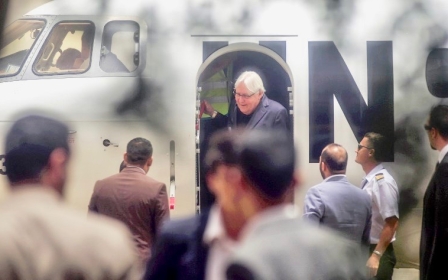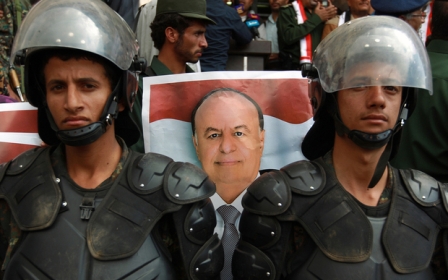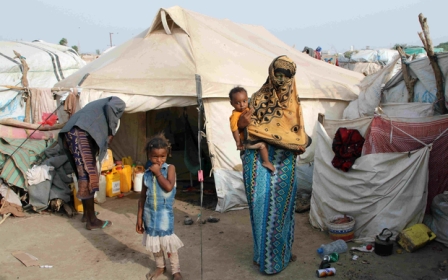Yemen: Coalition strikes continue to batter Houthi-held Hodeidah
A Saudi-led coalition conducted air strikes on Yemen's Hodeidah airport on Sunday to support forces trying to seize control from Houthi rebels, who are facing their biggest challenge in the war, Saudi and Houthi-run media reported.
Warplanes carried out five strikes on the port city of Hodeidah, a lifeline to millions of Yemenis, according to Saba, the official Houthi news agency. Saudi-owned broadcaster Al Arabiya also reported strikes on the airport.
Ground troops, including United Arab Emiratis, Sudanese and Yemenis from various factions, surrounded the main airport compound on Saturday, said a source in the coalition-allied Yemeni military.
The goal of the allies, led by the Emiratis, is to defeat the Houthis in Hodeidah, the only Red Sea port under their control, and cut off their supply lines to the capital, Sanaa.
"We have lived in a state of terror for three days because we are in a neighbourhood close to the airport," said resident Khaled Ateeq, 38.
The battle for Hodeidah could drag on, creating more suffering for civilians, who have endured air strikes, port blockades, hunger and a cholera epidemic.
The UN Office for the Coordination of Humanitarian Affairs said 4,458 households had been displaced from their homes in Hodeidah since 1 June, with 36 families losing their livelihood as their farms were damaged in the conflict.
UN envoy to Yemen Martin Griffiths arrived in rebel-held Sanaa on Saturday for a second round of talks since taking the post in February.
Houthi representative Hisham Sharaf, however, accused the Saudi-backed government of "obstructing negotiations", saying the Hudaida offensive had foiled any potential peace talks in a statement carried by the rebels' Saba news agency.
Griffiths, whose talks in Sanaa have been largely kept under wraps, is believed to be pressing the Houthis to cede control of the Red Sea port to a UN-supervised committee that would allow deliveries of commercial goods and aid to continue to flow.
On Saturday he called for restraint and said he was in contact with all the warring parties in a bid to halt the fighting.
The Saudi-led coalition has relied heavily on air strikes against the Houthis, who are highly experienced in mountain warfare. The group, which seized Sanaa in 2014, has fought a series of guerrilla wars with Yemen's national army and a brief border war with Saudi Arabia.
Its fighters have advanced on sandal-shod feet and by pick-up trucks in battles across Yemen. They are more suited than coalition forces for guerrilla warfare, should fighting extend to Hodeidah's densely populated neighbourhoods.
We have lived in a state of terror for three days
- Khaled Ateeq, resident of Hodeidah
As the Houthis battled to keep their turf at the airport, Yemenis fighting with the coalition piled into pick-up trucks, their cheeks bulging with the narcotic plant qat. They formed a convoy along a road overlooking the desert outside of Hodeidah.
Others with AK-47 assault rifles walked in sandals past armoured vehicles and took up positions in the sand. One fighter casually fired mortar bombs into the distance.
Houthis rule the most populous areas of chronically unstable Yemen, where many parties have been competing for territory and influence, from loyalists of the late president Ali Abdullah Saleh to southern separatists to al-Qaeda.
The United Nations says the assault on Hodeidah could trigger a famine, imperilling millions of lives. Residents who can't make ends meet are bracing for more hardship as both sides engage in the most strategic battle of a war of attrition that has killed more than 10,000 people.
Yahya Sohail had occasionally found work at Hodeidah's port. He fears that source of income could soon vanish.
"I take the money to cover the needs of one day and that’s it, it’s done," he said, speaking outside his shack, built from corrugated metal, palm fronds and torn blankets.
"Now if the port closes, where will I go to work? When this siege comes and this disaster happens, where am I going to find work?"
His wife, Um Ahmed, said the family had no cooking gas. A motorcycle, their only means of transportation, had broken down. Sometimes strong rains and wind tear down their tiny home.
"I have a young daughter who’s exhausted and sick, and we can’t get her medication or anything, only the necessary food. If a war happens, what are we going to do?" she said.
Riyadh has accused the Houthis of using the port to smuggle Iranian-made weapons, including missiles used to target Saudi cities - accusations denied by the group and Tehran. The Houthis deny being pawns of Iran and say they are fighting to evict foreign occupiers from Yemen.
Residents said Houthi fighters dug a large ditch at the northern entrance to Hodeidah to prevent coalition forces from advancing towards Sanaa. People in al-Rubasah neighborhood near the airport, meanwhile, said bullets were striking their homes.
Additional reporting by AFP.
New MEE newsletter: Jerusalem Dispatch
Sign up to get the latest insights and analysis on Israel-Palestine, alongside Turkey Unpacked and other MEE newsletters
Middle East Eye delivers independent and unrivalled coverage and analysis of the Middle East, North Africa and beyond. To learn more about republishing this content and the associated fees, please fill out this form. More about MEE can be found here.




